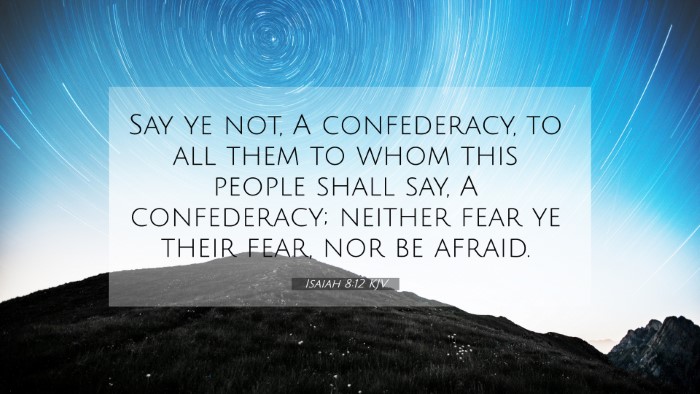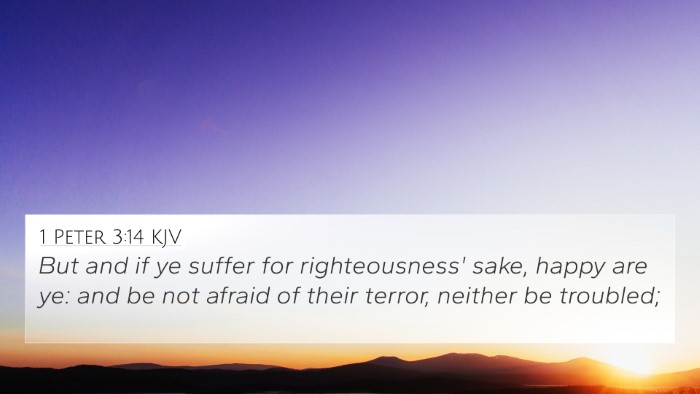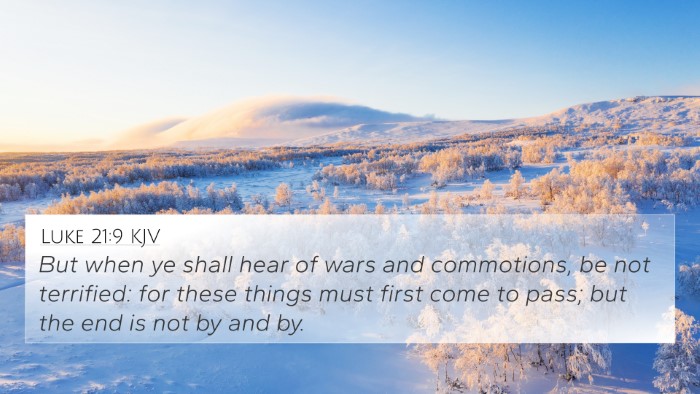Understanding Isaiah 8:12
Isaiah 8:12 states: "Say ye not, A confederacy, to all them to whom this people shall say, A confederacy; neither fear ye their fear, nor be afraid." This verse carries profound implications about fear, allegiance, and the nature of trust in God over worldly alliances. Let's explore its meaning with insights drawn from renowned public domain commentaries.
Summary of Interpretations
The primary focus of Isaiah 8:12 is a directive from God to His people regarding their response to political pressures and alliances that arise. The context reflects a time of crisis for the Israelites, who were tempted to look to human solutions rather than trusting in divine providence.
- Matthew Henry's Commentary: Henry emphasizes that God cautions His people against forming alliances based on fear and insecurity. The verse illustrates the futility of being influenced by the prevailing sentiments of the day and encourages reliance on God instead.
- Albert Barnes' Notes on the Bible: Barnes elucidates the dangers inherent in yieldings to social and political pressures to conform. He suggests that the mention of 'A confederacy' alerts believers to avoid erring worldly companionships that drive them away from faith.
- Adam Clarke's Commentary: Clarke highlights the importance of steadfastness in faith amidst external threats. He interprets the phrase as a reminder not to join in the fears or conspiracies that seem to dominate the ungodly populace.
Thematic Connections
This verse resonates with a number of biblical themes, including...
- Faith in God's sovereignty over human alliances.
- The distinction between worldly fear and divine assurance.
Bible Cross-References
To fully appreciate Isaiah 8:12, it is beneficial to explore related scriptures that enhance its message:
- 1 Peter 3:14: "But even if you should suffer for righteousness' sake, you will be blessed. Have no fear of them, nor be troubled." This verse complements Isaiah's exhortation to not fear those who conspire against them.
- Luke 12:4-5: "And I say to you, my friends, do not fear those who kill the body, and after that have no more that they can do. But I will show you whom you should fear…" Here, Jesus clearly articulates a rejection of earthly fears for a divine reverence.
- Psalms 56:11: "In God I trust; I will not be afraid. What can man do to me?" This psalm reinforces the trust in God's protection over succumbing to fear of man.
- Proverbs 29:25: "The fear of man brings a snare, but whoever trusts in the Lord shall be safe." This highlights the pitfalls of allowing human concerns to dictate one's actions.
- Isaiah 26:3: "You will keep him in perfect peace, whose mind is stayed on You, because he trusts in You." This verse succinctly correlates the theme of trust and peace in God’s presence.
- 2 Timothy 1:7: "For God has not given us a spirit of fear, but of power and of love and of a sound mind." This encourages believers to confront their fears with divine strength.
- Romans 8:31: "What then shall we say to these things? If God is for us, who can be against us?" An affirmation of divine support that transcends any earthly threats.
Applying the Message Today
The exhortation found in Isaiah 8:12 is just as relevant today. Believers often encounter societal pressures that challenge their faith and security. Understanding how to navigate these pressures is crucial. The insight provided by the interpretations of Matthew Henry, Albert Barnes, and Adam Clarke reminds us of these important truths:
- Stand Firm: Like the people of Isaiah’s time, we are called to stand firm in our convictions and not capitulate to fear-driven alliances.
- Guard Your Influence: Be wary of the voices that encourage fear—it is essential to seek the counsel of God rather than public opinion.
- Trust in God's Plan: Trusting God offers peace and a sound mind, shielding believers from the turmoil of the world.
Conclusion
In conclusion, Isaiah 8:12 serves as a powerful reminder to reject the fears instigated by the world and to anchor ourselves in faith. By cross-referencing various scriptures, we can find clarity and cohesion in our understanding of biblical principles. The inter-Biblical dialogue surrounding fear, trust, and alliance highlights a continuous theme of divine sovereignty that believers are encouraged to embrace, especially in these tumultuous times.












